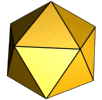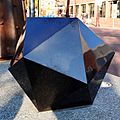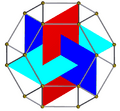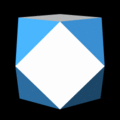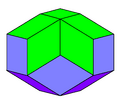Icosahedron facts for kids
An icosahedron is a special 3D shape that belongs to a group called Platonic solids. It's famous for having 20 flat sides, and each side is a triangle. Imagine a ball made up of many triangles – that's kind of like an icosahedron!
Contents
What is an Icosahedron?
An icosahedron is a type of polyhedron, which is a 3D shape with flat faces. It's one of the five Platonic solids, which are very special because all their faces are the same regular shape, and the same number of faces meet at each corner.
Icosahedrons are known for their many sides and their perfect symmetry. They look the same no matter which way you turn them. This makes them very interesting in math and science.
The Parts of an Icosahedron
Every icosahedron has specific parts that make up its shape:
- Faces: An icosahedron has 20 flat surfaces. Each of these surfaces is a perfect equilateral triangle, meaning all its sides are the same length.
- Edges: It has 30 edges. An edge is where two faces meet.
- Vertices: It has 12 vertices, which are the corners of the shape. At each vertex, five triangular faces meet.
This combination of 20 faces, 30 edges, and 12 vertices gives the icosahedron its unique look.
Where Can We See Icosahedrons?
Icosahedrons might seem like complex math shapes, but they appear in many places around us!
- Nature: Some viruses, like the adenovirus, have an icosahedral shape. This shape is very strong and efficient for protecting their genetic material.
- Games: You might have seen icosahedrons as 20-sided dice (often called a d20) in games like Dungeons & Dragons.
- Architecture: Sometimes, buildings or domes are designed using principles of icosahedrons because of their strength and ability to cover large spaces.
- Art and Design: Artists and designers use icosahedrons for sculptures or patterns due to their beautiful symmetry.
This shape is not just a mathematical idea; it's a practical and beautiful form found in the world.
Images for kids
-
Construction from the vertices of a truncated octahedron, showing internal rectangles.
-
Progressions between an octahedron, pseudoicosahedron, and cuboctahedron.
See also
 In Spanish: Icosaedro para niños
In Spanish: Icosaedro para niños


